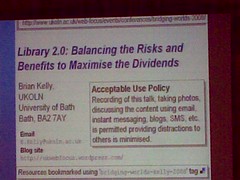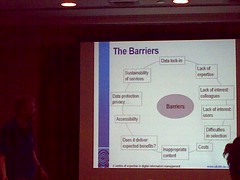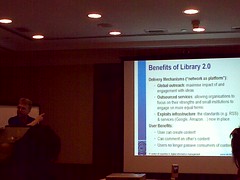Brian Kelly. National Web Adviser to UK universities and cultural heritage organisations.

Brian started by saying it's OK to record his talk. Then explained why he chose to allow that in spite of some risks. There's a risk he might say or do something embarrassing and it gets amplified (through blog posts/ videos). But he has weighed that risk against the benefit of his ideas being shared.
Excellent way of illustrating his main point!
Brian elaborated on the perceived barriers of Web 2.0 adoption. He cited his experiences of using 3rd party services. Faced issues like reliability and sustainability. Other possible issues include data privacy of our users, inappropriate content co-hosted at the 3rd party site. Of particular concerns for public sector services are content that carry political statements, or porn (that could be accessed by minors).

Broad ways to address the problems:
- Assess and manage
- New media literacy
- Evidence based policy making
- Reinterpret policies
- Understand the limitations of 3rd party services (e.g. is there an export-data feature, does it work? data backups) and develop work-arounds
Brian talked about sustainability, i.e. what if the free service goes bust and is no longer available. The companies become bankrupt (imagine... Google goes belly up and millions of Gmail user accounts become lost... shudder).
But Brian quickly made the point that banks also go bankrupt, but people continue to use them. Good point!

He also raised the question of whether economic downturns would affect the provision of those free-to-use services. And what happens if libraries find that their service delivery (though those platforms) are affected.
[Well, I think one approach is to decide what we would consider as Core and Non-core services. Make sure we own and host the former, and the latter can be hosted on free 3rd party services. Communicate this to users, so that they understand the big picture].
Brian's paper can be downloaded, here.
Thinking Aloud
I thought the point of Brian's talk, in the context of Social Media, was to be conscious of risks and benefits.
And not be paralysed by one aspect while being too enamoured with the other.
From what I've heard from the speakers (Nyla, Jenny Levine, John Blyberg) social media has a tendency to result in unintended consequences.
It was fitting that Brian chose to talk about managing risks. Because social media will change the "power-control relationship" between customers and service providers. The speed of change is also fast in social networks.
(This reminds me -- sometime soon, I'll talk about the Just Share service at the www.PL.sg website, which involved some risk management).
BTW, also check out Brian's YouTube clips he made, to answer FAQs about blogging. Here's part 6 (you can work your way to part 1 from there).
[Next: Part 9]

No comments:
Post a Comment
Join the conversation. Leave a comment :)
Note: only a member of this blog may post a comment.